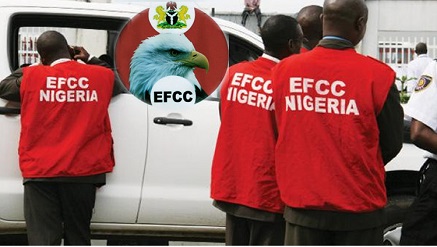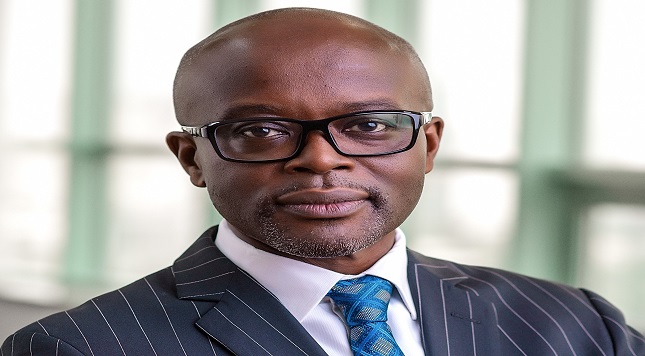General News
EFCC Boss, Others Corner 500 FG Houses in Lagos, Abuja

Influential ministers and aides of former President Goodluck Jonathan were among those who allegedly shared over 500 Federal Government houses located in highbrow areas of Abuja and Lagos as parting gifts from the immediate past administration, according to Sun Newspapers.
Beside the influential ministers and top presidential aides, heads of some powerful federal agencies like the Economic and Financial Crimes Commission (EFCC) and the armed forces as well as top military officers are also beneficiaries of the last minute largesse of the Jonathan’s administration, as documents sighted in the office of the Secretary to the Government of the Federation (SGF) have revealed.
Curiously, most of the beneficiaries have one common feature; the allocation of the houses to them was not done in their individual names but in the names of front-companies and/or faceless companies.
Another interesting development is that with the decision of President Muhammadu Buhari to probe the Jonathan administration with a view to recovering billions of public funds and assets illegally taken by top officials of the immediate past government, many of the beneficiaries of the last minute sharing of public assets have abandoned the properties, most of which are now under lock and key and overgrown with weeds while others have refused to pay for the properties to avoid losing their money in the event that the Buhari government choses to revoke the sales.
A source in the SGF office told Sun that properties whose owners are now scared to take possession of them are scattered all over Asokoro and Maitama areas of Abuja as well as Ikeja GRA, Ikoyi, Victoria Island and Apapa areas of Lagos.
Investigations by Saturday Sun revealed that the abandoned properties are more in Lagos.
They litter Emotan road, Apapa GRA; Liverpool road, Apapa, Marine road, Apapa; Park lane and Child avenue, both also in Apapa. In Ikoyi, they are located at Oyinkan Abayomi (Former Queen’s Drive) and Bourdillion road where the EFCC boss, Ibrahim Lamorde has his allocation; a mansion and two bungalows on a large expanse of land.
It was also gathered that while some of the former ministers and presidential aides have their allocations in Abuja, top military officers and some heads of government agencies have theirs in Lagos. Further investigations show that the former ministers, presidential aides and Heads of Departments and Agencies were allocated Guest Houses and other buildings owned by their MDAs at ridiculous prices.
The source, who is a top official of the SGF office, however, told Saturday Sun that most of the houses were abandoned because “the owners are obviously looking for private sector individuals that can buy them as many of them didn’t really get the allocations to live in the houses, they only want to sell them off and make profit.”
When asked why the allocations were done in the names of companies rather than the names of the actual beneficiaries, the top official said: “Most of the owners got the houses while still in government and they wouldn’t like to disclose such huge assets in their assets declaration forms with the Code of Conduct Bureau because of the questions on the source of the funds used to pay for such. We’re only the ones who knows who owns what but if you follow the table of allocations, you will only find names of companies as beneficiaries.”
The source, however, exonerated the committee in charge of the houses which is directly in charge of some of the sales of any complicity, adding: “Decisions and approvals more often than not, come from the Presidency.”
“The committee also has no control over which name will be used for the purpose of allocation and what such beneficiaries do with the properties afterwards”, the official added.
Beside the sales done by the committee, it was also learnt that some public institutions like the NNPC, PHCN, NPA and CBN handled the sales of some of their properties based on approval from the Presidency. It was said that some of the controversial sales could have been done by the ministries and agencies that have presidential approval to dispose of their own assets.
Another source in the Ministry of Lands and Housing however said that the number of houses allocated was far lower than 500. The source, who is an official of the ministry, disclosed: “It is true that some requests for allocation came towards the end of the last administration but the real allocation was tactically delayed by some officials to avoid running into trouble with the then in-coming Buhari administration.”
Reacting on behalf of the Chairman of Economic and Financial Crimes Commission (EFCC), the commission’s spokesman, Mr. Wilson Uwujaren said he was not at liberty to comment.
Although he did not deny the claims, he insisted on sighting the document wherein Lamorde was named as one of the beneficiaries. He maintained that his reaction would be based on what the document alleged, rather than reacting in a vacuum.
He further insisted that the claims could have emanated from anybody who might be out to smear the image of the EFCC chairman.
“I cannot just react to your claims. At least, it is only fair that I see the document you are relying on. I need to study the contents of the document and then react accordingly. You know too well that anybody can make such a weighty allegation just to smear the image of the chairman of EFCC,” Uwujaren added.
But the presidency in its reaction vowed to investigate the development. Special Adviser to the president on Media and Publicity, Mr Femi Adesina said the Buhari administration “will investigate such deals.”
President Buhari has said he will not extend his corruption probe beyond the administration of former President Goodluck Jonathan.
The President had said during his recent visit to the US that he would arrest and prosecute past ministers and other officials who stole Nigeria’s oil and diverted government’s money into personal accounts.
But the President’s Special Adviser on Media and Publicity, Femi Adesina, said the President will limit his anti-corruption war to the immediate past administration.
He said even before he was inaugurated on May 29, the President had categorically stated that he would not extend his corruption probe beyond the Jonathan government.
“If you recall, that was already settled before he got inaugurated as President. He has said he will not waste time digging into the far past,” Adesina said.
“The far past will include Obasanjo and others. But the President has said he will not waste time to go that far.”
Before leaving office, Jonathan had said any probe by the new government would be seen as a “witch-hunt” if it fails to go beyond his administration.
General News
Conoil Bonanza Winners Emerge

Conoil Plc is spreading joy this Valentine season as the first group of winners in its Valentine Bonanza promotion have been announced and rewarded. Launched on February 14, the campaign continues to delight customers at participating retail outlets.

The initial raffle draw, conducted on February 21, saw fortunate customers receive ₦10,000 worth of free petrol each. The draw was carried out publicly, with media representatives present to ensure full transparency. With the promotion still ongoing, more customers have the opportunity to join in and potentially be among the next winners.
A Conoil Management spokesperson explained that the initiative is a way to show appreciation to loyal customers for their ongoing support. “Our customers have responded impressively to the bonanza, with strong participation recorded across our stations,” the spokesperson said.
The second and final phase of the promotion is now in motion. Customers who purchase at least 10 litres of petrol at any participating Conoil station remain eligible to win in the grand finale raffle.
The grand finale is set for February 28 at 12 noon. Motorists in Lagos and Ogun states are encouraged to visit Conoil outlets to collect their tickets and take part in the exciting conclusion of this Valentine celebration.
General News
PalmPay Couples Show How Love Is Funded Digitally

PalmPay users took to the #LoveWithPalmPay campaign to show how experiences are powered through seamless banking.

It’s the month of love and social media has been filled with couples showing affection with gifts. As digital payments become embedded in everyday life, the way relationships are planned, funded, and experienced is evolving.
Recent insights from SBM Intelligence 2025 ‘Love in the Air’ report show that despite economic pressures, most Nigerians still set aside dedicated budgets for Valentine’s Day, with the largest percentage planning to spend between N51,000 and N100,000, while less than 5% are willing to spend above N500,000.
This growing intentionality highlights the need for platforms that help people manage their money more effectively, offering features like free transfers and tools that make it easier to send, track, and preserve funds while still showing up for meaningful moments.
Through the #LoveWithPalmPay campaign, PalmPay set out to show how the platform is enabling users to plan, pay, and celebrate meaningful moments with greater ease.
During the Valentine’s season, PalmPay invited couples across Nigeria to share their stories through the #LoveWithPalmPay campaign, celebrating how digital banking supports their individual expressions of love.
The campaign saw strong participation, with many PalmPay couples submitting entries that showcased how they use the app to plan surprises, pay for outings, and stay connected through everyday transactions.
From these entries, four couples were selected, each showcasing how PalmPay has enabled fast and reliable transactions in key moments.
One video from @simply.omotoshan, one of the selected couples, captures the role of seamless payments in making their spontaneous moments possible.
She said in her entry video: “Our cutest money moment with PalmPay was when we planned our Valentine’s picnic and realized we had forgotten half of the things we needed; literally, half of everything. We rushed to the mall to get cakes, food, decorations, and all the essentials. When it was time to pay, we used PalmPay.
“The transaction was smooth, fast, and stress-free. In no time, we were done setting up our Valentine-themed picnic with everything perfectly ready. Honestly, all our experiences with PalmPay have been easy and satisfying, but this one is definitely our cutest money moment. Thank you, PalmPay.”
A testimonial from the fourth selected couple, Mohammed and his wife, reflects his excitement: “Hello PalmPay, thank you so much for selecting us as one of the winners of the #LoveWithPalmPay campaign. We truly appreciate this. My wife and I are very grateful. Thank you, PalmPay, for the love and support. We’re so happy and thankful for the N100,000 reward. We love you, PalmPay, and long live PalmPay. Thank you so much.”
Beyond the feel-good stories, the campaign reflects a broader shift: fintech is no longer just about transactions, it’s about enabling experiences. Reliable payments, fast transactions, and accessible financial tools reduce the friction that can disrupt important moments, allowing users to focus on connection rather than logistics.
From paying for dinner to managing other expenses, PalmPay continues to demonstrate how digital financial services support modern relationships, proving that in today’s economy, love is not only felt, it’s funded digitally.
General News
KPMG Strengthens Africa Leadership to Support Long‑term Growth Across the Continent

KPMG has appointed Tola Adeyemi as Chief Executive Officer for KPMG one Africa, alongside the addition of Professor Olayinka David‑West and Dr. George Njenga as independent members of the Africa Governance Council (AGC).

Effective from March 2026, the appointments reinforce the firm’s leadership expertise, underscore a long‑term commitment to Africa and highlight confidence in the continent’s growth potential.
“Africa is one of the most dynamic and promising regions in the global economy, and KPMG is committed to playing a meaningful role in its growth story,” said Tola Adeyemi, incoming CEO for KPMG One Africa.
He continued: “It is a privilege to step into this role at such a pivotal moment for both KPMG and the continent. I look forward to building on our strong, connected and high‑performing base to deepen collaboration and deliver consistent quality and impact across our markets.”
KPMG is recognised globally for its commitment to quality, integrity and professional excellence, supported by a strong global network of member firms. Trust remains the foundation of the audit and accounting profession, with high standards of governance, ethics and audit quality increasingly demanded across Africa’s public and private sectors.
KPMG One Africa’s approach brings the continent closer together with strong leadership to strengthen cross-border collaboration and offer shared expertise and consistency which is business‑critical to help clients navigate complex risks and unlock sustainable growth opportunities.
Commenting on the appointment, Professor Ben Marx, Chairman of the Africa Governance Council, said: “Tola Adeyemi is exceptionally well positioned to lead KPMG One Africa. In addition to his global perspective as a member of the KPMG Global Council, he brings significant influence and credibility as a respected business leader across the continent.”
The appointments of Professor David‑West and Dr Njenga to the Africa Governance Council, which provides board level governance, further strengthens independent oversight, bringing strong academic credentials alongside deep strategic and business expertise.
“These appointments reinforce KPMG’s commitment to strong governance, accountability and leadership depth,” Marx added. “They complement our established African leadership team, in‑country managing partners and regional senior partners, further enhancing our client‑centric approach across Africa.”

 E-Business2 days ago
E-Business2 days agoAfDB, UNDP Launch $10Bn AI Initiative for Africa

 News3 days ago
News3 days agoNITDA Urges Stronger State Partnerships as Key to Digital Economy Goals @ South-South Stakeholders Forum

 Telecom3 days ago
Telecom3 days agoGSMA Launches Innovation Fund to Accelerate Green Transition Through Mobile Technology

 Telecom2 days ago
Telecom2 days agoGrey Expands Cross-Border Banking with USD Accounts, USDC Support

 Telecom3 days ago
Telecom3 days agoProf. Adeyanju is Strengthening Nigeria’s Digital Backbone for a Connected Future in Two Years of Purposeful Leadership

 E-Business3 days ago
E-Business3 days agoFirm Identifies RenEngine Loader Distributed Through Pirated Games and Software

 E-Financial3 days ago
E-Financial3 days agoFidelity Bank Launches HerFidelity Apprenticeship Programme 2.0 to Boost Women Entrepreneurship

 E-Financial3 days ago
E-Financial3 days agoTAJBank Secures A1 Ratings from Agusto, Datapro















